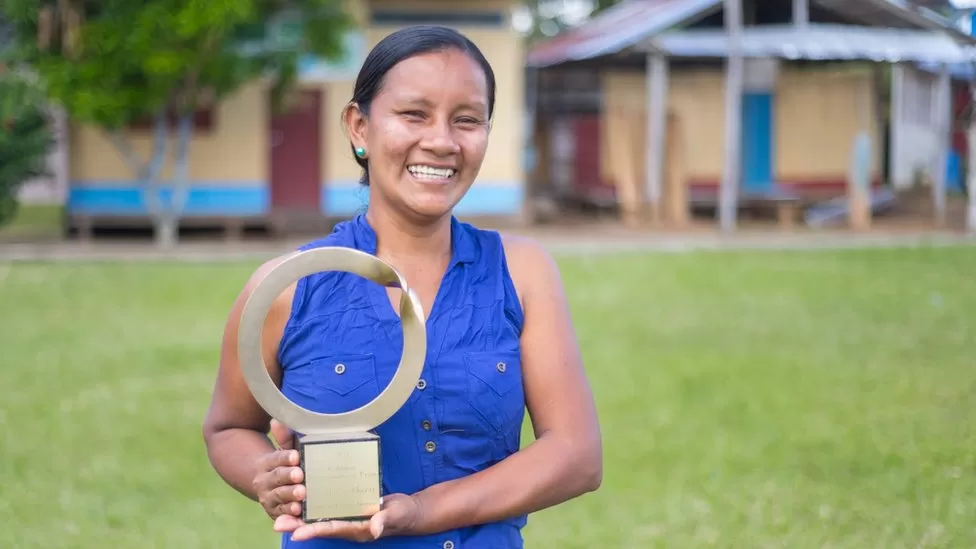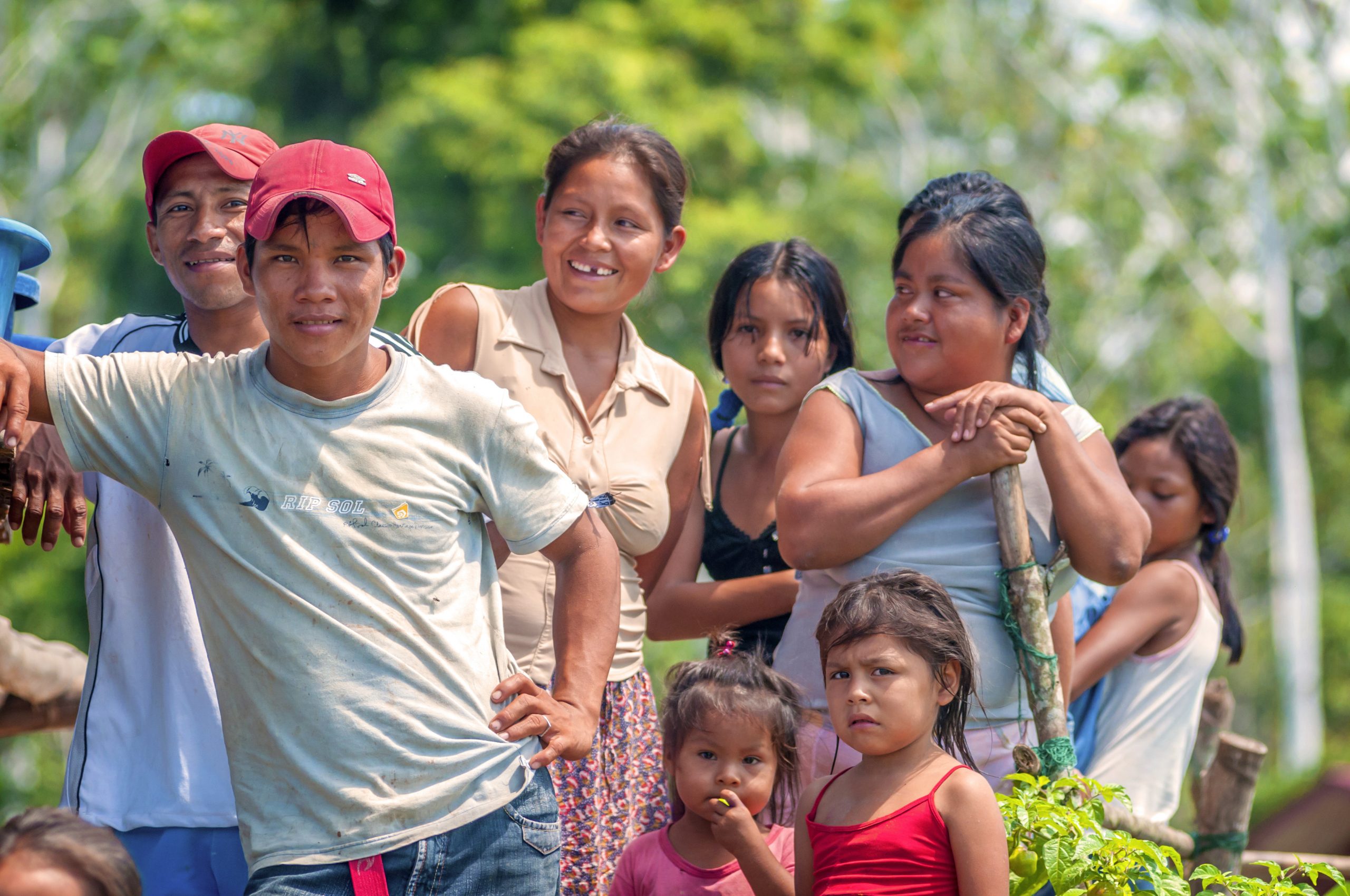2022-11-16
By Jack Lo Lau. Translated by Alejandra Kaiser
When she was just 10 years old, Liz Chicaje (39) began to care for her loved ones. Washing other people’s clothes and taking care of other families’ children, she managed to bring some money to feed her family. Ever since she can remember, she has protected and helped others. As she got older, she became even more responsible for other people. In 2014, she became the first woman president of the Federation of Native Communities of Ampiyacu – Fecona – representing the 14 communities in her basin. This position and the responsibilities she later obtained, allowed her to be recognised all over the world.
In 2021, this leader of the Bora ethnic group was awarded the Goldman Prize, in recognition of her fight for the protection of her ancestral territory and for her perseverance in the process of categorising the Yaguas National Park in 2018. For months she committed herself to visiting all the communities, to meet with governors, as well as with different leaders, to finally achieve her goal: the protection of their territory and the subsequent recognition of the Yaguas National Park. Liz’s efforts have established a standard in issues of ancestral territories making her an important referent when it comes to indigenous land rights.

Liz Chicaje Churay with the Goldman Prize for South and Central America
A year after the award, we find her in Iquitos, two days by boat from her community, Bora de Paucarquillo, visiting two of her children who will study in the largest city in the Peruvian Amazon.
We have seen many demonstrations in the country asking for justice in the Amazon. How do the indigenous communities in the country feel about the threats, invasions, and other issues they are experiencing?
On one side, we feel very left behind by the State. There are neither answers nor the willingness to attend to our needs. For example, we have been pursuing the titling of the, but none have succeeded after years of persistence. We are told that there is no staff, that there is no budget to carry out studies or travel. Documents go from one office to another, or sit in a corner gathering dust. If they can’t secure our territory, how can we ask them for other things we need?
Like justice?
Exactly. Indigenous Peoples are constantly threatened by invaders, illegal miners, loggers, drug traffickers, who do as they please. We die and the government is not stopping them, they don’t care about us. We aren’t asking extraordinary measures, only safety to go on with our lives, just like our ancestors thousands of years ago.
Our position has always been to care for the forest, which has been transferred from one generation to the next. But now we are in a situation where we are begging the government to recognize our ancestral rights. And that’s not fair. The laws hinder us to get the land titling. We are not heard.
How can the Government’s attitude be changed?
We have to fight to be heard, respected and recognized. If this has always belonged to us, why do we have to go through this now? We feel powerless. We don’t want to confront anyone; we just want to live in peace in our own territories. But the people who are responsible for this don’t know our reality, they don’t understand it and put a lot of obstacles in our way. They are in their offices and they don’t care about anything else

And after the recognition of Yaguas, has anything changes?
The only thing that has improved is that now SERNANP – the National Service of Natural Areas Protected by the State – has its office in the basin, and they have begun to help us with small productive projects, as the reforestation of timber trees or the protection of cocoa, which is now being studied.
Have they helped you with security issues?
Not at all. The one responsible for security is the central government, which is not doing much. Nonetheless, we have not sat idly and we are developing community surveillance, which is the main groundwork for protecting our territory.
What has the government done for the Indigenous Peoples so far?
There is no overview, no plan, no benefits. There has been no progress. There has been a lot of chaos in this first year. Many conflicts between the different government’s powers. And this has harmed the people. They have to agree to start working for all Peruvians. They have to go out to the field and see the communities’ needs.
"“Everyone cares about the deforestation of the forest, but who cares about the communities? The gaps continue to widen, as do our needs.”"
What would you like to ask the authorities?
The main issue: the titling of our communities. If we secure our lands, this will allow us to develop projects that benefit us. To access funds or contests, they ask us for the land titles and that we are formalised. And as communities live right now, we can’t apply. We have a lot of potential in the communities, we have crafts, fruit products, but we need support. Without money we cannot do anything. We want to educate our children and grow. And the key to growth is the titling of our lands.
It is paradoxical that having lived thousands of years in the forest, you have to hunt down the State to obtain recognition…
Today the message always is that the indigenous are the guardians of the forests. That we conserve, take care, protect them. But everything remains in the message, since our economy does not improve, on the contrary, it’s getting worse. Without an economic income nothing can be done in this life. Everyone cares about the deforestation of the forest, but who cares about the communities? The gaps continue to widen, as do our needs. Children and young people need to study. Those who manage to do so leave the communities and do not return.
And the ancestral knowledge is lost…
Today our youth is leaving to seek opportunities. But we don’t give them the option to come back and apply what they learned. There are no incentives to return because we don’t have the opportunity to develop in our own territory. We have to strengthen the indigenous communities and give more value to our youth if we want our culture not to be lost.
Jack Lo is a Peruvian journalist focused on indigenous communities’ rights, socio-environmental conflicts, and natural territories and wildlife. He is a regular contributor to Mongabay Latam, EFE and Chinese Dialogue, and the Tenure Facility among others.
Alejandra Kaiser is a freelance writer specialised in development, human rights, and indigenous issues topics.
Articles